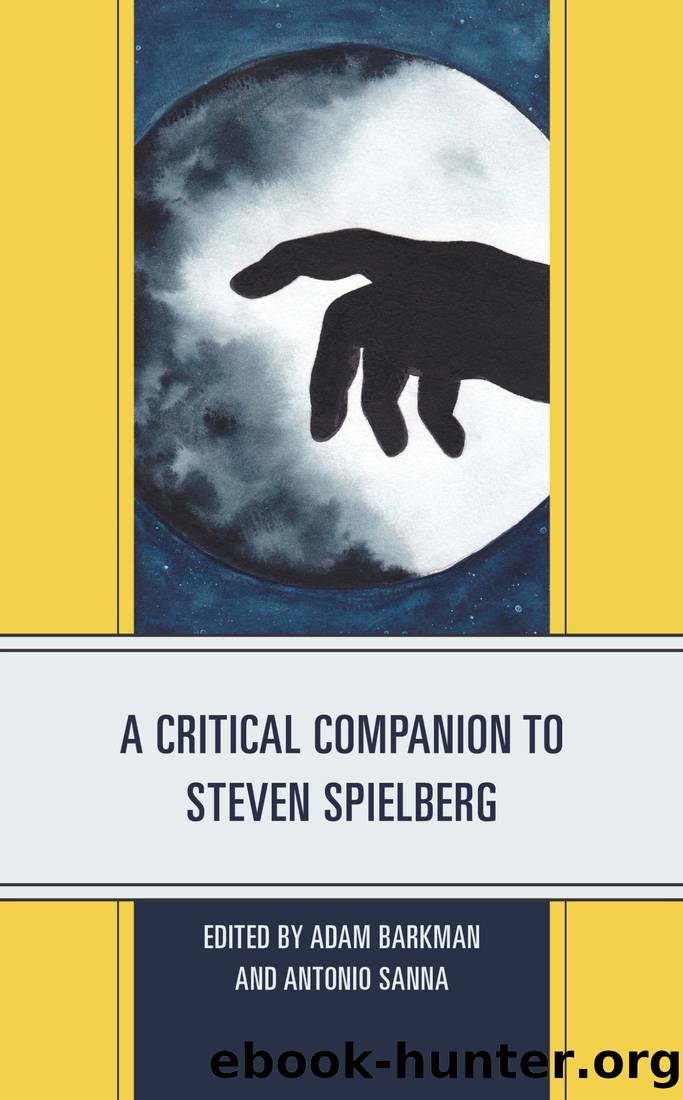A Critical Companion to Steven Spielberg by Barkman Adam;Sanna Antonio;

Author:Barkman, Adam;Sanna, Antonio; [Barkman, Adam;Sanna, Antonio;]
Language: eng
Format: epub
Tags: undefined
ISBN: 9781498593595
Publisher: RowmanLittlefield
Published: 2012-09-15T00:00:00+00:00
In the finale, Indy shows humility and vulnerability, recognizing that there are greater forces than him, and that those forces are not his to try to possess or control. The very form and structure of the film presents the audience with this same experiential arc. We approach the film with expectations and preconceptions formed by prior films in the genre, our view of the world around us, and the nature of our own experiences. When Spielberg subverts those expectations, it prompts us to take notice. The film does not weave the supernatural into scene after scene, but rather convinces usâby way of omissionâthat this is a world absent magic or spiritual powers. In fact, the greatest power throughout most of the film is Indiana Jones himself, so as an audience we share in his belief that he alone will save the day. This makes the moment when the Ark is opened a revelation, not only for the characters within the film, but also for the audience. We experience the surprise and the wonderment that there was more to this world than we had imagined. We are humbled, for we had misplaced our faith, just as Indy had.
Raiders of the Lost Ark echoes the Greek myths quite closely, attributing to the gods those grander forces beyond human power. While it is not his only film to dabble in the supernatural, Spielberg tends to root his mythology elsewhere, especially within the twentieth centuryâs overriding belief in science and technology. This is evident in a film like A.I. Artificial Intelligence, which chronicles manmade robots displacing humanity, and also in Jurassic Park, which presents the terrifying and awe-inspiring powers of genetic engineering. The final triumph of the Tyrannosaurus Rex appropriately challenges us to consider the monster that may be unleashed when we try to tamper with or control nature. As one character aptly says in the film, âGenetic power is the most awesome force the planetâs ever seen, but you wield it like a kid thatâs found his dadâs gun.â[27] Meanwhile, Spielbergâs extraordinary tales of alien visitorsâreplete with lights from the heavens, special powers, and resurrectionsâalso follow the patterns of ancient religious stories, but are brought to life with a modern sensibility. Today, perhaps we are more willing to believe in sentient creatures from other worlds than we are in gods and demigods from Mount Olympusâbut the implication is the same: our universe is far larger than what we experience here on Earth, and it is full of awes and mysteries beyond our imagination.
It is evident that Spielbergâs films share much in common with Greek tragedies, but despite clear parallels in structure, spectacle, and purpose, there is one aspect where Spielbergâs films usually differ from those classic dramasâthat is, his films rarely end tragically. In fact, his inclination toward a happy ending permeates his work even more frequently than the deus ex machina. Reconciling this tension is at the heart of understanding why Spielbergâs films resonate with such a broad audience. Ultimately, the directorâs
Download
This site does not store any files on its server. We only index and link to content provided by other sites. Please contact the content providers to delete copyright contents if any and email us, we'll remove relevant links or contents immediately.
How To Write A Damn Good Thriller by James N. Frey(375)
Naked as Nature Intended by Pamela Green(363)
30 Movies to Get You Through the Holidays by Roger Ebert(360)
Bond, James Bond by Brad Gilmore(293)
It's Only a Movie! by Haberski Jr. Raymond J(277)
Chinese films in focus II by Unknown(255)
The Fellowship of the Knits: Lord of the Rings: The Unofficial Knitting Book by Tanis Gray(241)
How To Write A Novel The Easy Way Using The Pulp Fiction Method To Write Better Novels: Writing Skills by Jim Driver(234)
The Greatest Show on Earth by Jerry Pinto(222)
Smartphone Cinema: Making Great Films with Your Mobile Phone by Bart Weiss(211)
Film Truth; November, 1920 by Anonymous(211)
The Garden in the Machine by Unknown(206)
The Reel Truth by Reed Martin(198)
Charles McGraw by Alan K. Rode(197)
Jurassic Park and Philosophy by Watkins Jessica Michaud Nicolas(196)
Jafar Panahi: Interviews by Unknown(193)
Euro-Visions: Europe in Contemporary Cinema by Mariana Liz(191)
Thomas Mann and Friedrich Nietzsche: Eroticism, Death, Music, and Laughter by Caroline Joan Picart(190)
The Japanese Cinema Book by Hideaki Fujiki & Alastair Phillips(187)
